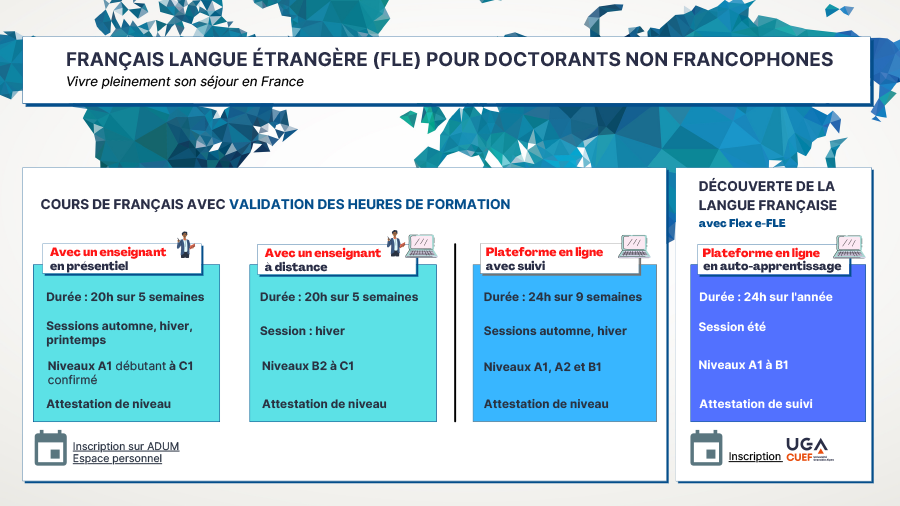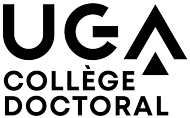Apprentissage de l'anglais
GENERAL ENGLISH
- Remedial English (levels : beginners, false beginners, elementary A1, A2,B1-) - 24hrs - Caroline Skudder - 2 annual sessions of 8 classes of 3hrs
Objectives : review of the basics of English
• Oral expression (introducing oneself and presenting one’s thesis topic)
• Listening comprehension (understanding the main message in a conversation with various accents)
• Reading comprehension (understanding a scientific article and overcoming unknown words)
• Written expression (writing in more formal English)
• Grammar (tenses and passive voice for scientific English)
• Vocabulary (survival vocabulary, basic scientific terms, formal and informal English),
• Methodology (how to acquire new vocabulary, develop listening strategies, conduct a literature review, etc.).
- Communicating Effectively in General English - (levels B1, B2, C1) - 24 hrs - Caroline Skudder – 3 annual sessions, each consisting of 8 classes of 3 hours
Objectives : this course aims to help participants communicate confidently in everyday and professional contexts related to their research activities
• Speaking (introducing oneself and one’s thesis, pronouncing scientific terms correctly, dumbing down for a general audience, holding conversations, and actively participating in meetings)
• Writing (writing emails, formal letters, and letters for job applications)
• Listening comprehension (becoming familiar with various English accents and understanding the overall meaning of spoken content)
• Reading comprehension (acquiring techniques to approach general and scientific texts effectively)
• Vocabulary (using idiomatic expressions and social interaction phrases, developing formal and scientific vocabulary, identifying false friends, and distinguishing between British and American English)
• Grammar (reviewing question formation, asking more elaborate and polite questions, and revising verb tenses)
ENGLISH FOR THE THESIS
- Communication in Oral Scientific English - (levels B2, C1,C2) – 24 hours – Caroline Skudder – 5 annual sessions of 8 classes of 3 hours
Objectives : how to deliver a professional and effective oral presentation in scientific English :
• Introducing yourself and your thesis to an audience
• Understanding the structure and methodology of effective oral presentations
• Improving overall pronunciation, with a focus on scientific terminology
• Starting and ending a presentation effectively
• Exploring the 7 key rhetorical techniques for an impactful delivery
• Designing and presenting effective visual aids (PowerPoints and scientific posters)
• Avoiding reliance on written notes during presentations
• Managing the question-and-answer session with confidence
• Expanding vocabulary and grammar specific to oral scientific communication
- Writing Articles in Scientific English - (levels B2, C1, C2) – 24 hours – Caroline Skudder – 5 annual sessions, each consisting of 8 classes of 3 hours
Objectives : how to write scientific articles in English within one’s field of research. It focuses on mastering the structure and style of scientific writing and improving the accuracy of written communication by exploring methodology and key language features. Topics include:
• Understanding the structure of a scientific article
• Learning the methodology for developing scientific writing
• Reviewing key grammatical and lexical structures, with a focus on the conventions of scientific English
• Analysing thoroughly the content and form of each section of an article: title, abstract, introduction, methods, results, and discussion
• Handling captions, references, graphs, tables, and other visual elements
• Writing the abstract
INTENSIVE COURSES
Both English in general and for the thesis
- Crash courses in Speaking (Oral expression) (levels B1+, B2, C1) 12 hours – Caroline Skudder – 1 annual session of 4 classes of 3 hours
• Speaking more fluently and naturally in English
• Communicating more effectively about one's research
• Speaking spontaneously on a given topic
• Expressing opinions, agreement, and disagreement
• Adjusting language level according to the audience
• Improving pronunciation
- Crash courses in Listening (oral comprehension) (levels B1+, B2, C1) – 12 hours – Caroline Skudder – 1 annual session of 4 classes of 3 hours
• Enhancing listening comprehension
• Training one’s ear to recognize various accents and intonations
• Developing a methodology for active listening
• Focusing on the main message rather than fillers or distracting expressions
• Understanding native speakers, scientific talks and presentations, and TV news
• Learning English through films
• Preparing for the listening sections of the four main certifications
- Crash courses in Reading (written comprehension) (levels B1, B2, C1) 12 hours – Caroline Skudder – 1 annual session consisting of 4 classes of 3 hours
• Practicing reading in general English (literary and journalistic texts)
• Understanding and analysing scientific articles
• Developing faster and more active reading strategies using skimming and scanning
• Acquiring effective note-taking methods
• Overcoming difficulties with unknown vocabulary
• Conducting a literature review
- Crash courses in Writing (Written expression) (levels B1, B2, C1) – 12 hours – Caroline Skudder – 2 annual sessions of 4 classes of 3 hours
• Writing in formal and academic English
• Avoiding the most common mistakes
• Adapting writing style and tone to suit different audiences
• Learning the basics of scientific article writing
• Writing professional emails
• Writing motivation letters and CVs for applications
- Crash courses in Vocabulary (levels B1, B2, C1) – 12 hours – Caroline Skudder – 1 annual session of 4 classes of 3 hours
• Learning the 100 most common idioms (60 in general English, 40 in scientific English)
• Acquiring techniques to retain advanced-level vocabulary
• Becoming familiar with academic vocabulary and mastering scientific terminology
• Distinguishing between formal and informal English, and using the appropriate register depending on the context
• Identifying key differences between British and American English
• Studying lexical challenges such as phrasal verbs and false friends
• Strengthening vocabulary in several key areas: media and communication, professional English...
- Crash courses in Grammar (levels B1, B2, C1) – 12 hours – Caroline Skudder – 1 annual session of 4 classes of 3 hours
• A diagnostic test
• The English tense system
• The passive voice in general and scientific English texts
• Verb patterns (infinitives & gerunds)
• Question formation (subject & object questions, direct & indirect questions, polite formulations)
• Link words (to improve scientific writing)
• Modal verbs, phrasal verbs (and their idiomatic usage), adverbs
Revision of the fundamental grammar points in order to express oneself in correct English.
You can assess your English level in advance with the English test SELF (code : sdlang)
Apprentissage du français
Plusieurs possibilités pour apprendre le français : en présentiel ou à distance en fonction de vos disponibilités et de votre niveau :
- [FLE] Cours de français plateforme EN LIGNE (pour doctorants non francophones niveaux A1, A2 et B1) - 24h - CUEF - 2 sessions
- Improve the students’ level of French.
- Understand the codes of the French culture.
- Facilitate the integration in Grenoble.
- [FLE] Cours de français avec un enseignant EN PRESENTIEL (pour doctorants non francophones niveaux de A1 à C1) - 20h - CUEF - 3 sessions
The goals of the communicative approach with operative prospects teaching are for the learners to acquire a command of French that will enable them to efficiently communicate with French speaking people from the academic and then the professional world. The language exercises offered will always have a practical goal of communication.
- [FLE] Cours de français avec un enseignant A DISTANCE (pour doctorants non francophones niveaux de B2 à C1) - 20h - CUEF - 1 session



